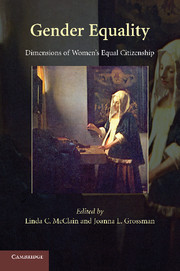Book contents
- Frontmatter
- Contents
- Contributors
- Acknowledgments
- Gender Equality
- Introduction
- PART I CONSTITUTIONAL CITIZENSHIP AND GENDER
- PART II POLITICAL CITIZENSHIP AND GENDER
- 6 Women and Antiwar Protest: Rearticulating Gender and Citizenship
- 7 Stem Cells, Disability, and Abortion: A Feminist Approach to Equal Citizenship
- 8 Representation, Discrimination, and Democracy: A Legal Assessment of Gender Quotas in Politics
- 9 Citizenship and Women's Election to Political Office: The Power of Gendered Public Policies
- PART III SOCIAL CITIZENSHIP AND GENDER
- PART IV SEXUAL AND REPRODUCTIVE CITIZENSHIP
- PART V GLOBAL CITIZENSHIP AND GENDER
- Suggested Readings
- Index
- References
9 - Citizenship and Women's Election to Political Office: The Power of Gendered Public Policies
Published online by Cambridge University Press: 05 August 2012
- Frontmatter
- Contents
- Contributors
- Acknowledgments
- Gender Equality
- Introduction
- PART I CONSTITUTIONAL CITIZENSHIP AND GENDER
- PART II POLITICAL CITIZENSHIP AND GENDER
- 6 Women and Antiwar Protest: Rearticulating Gender and Citizenship
- 7 Stem Cells, Disability, and Abortion: A Feminist Approach to Equal Citizenship
- 8 Representation, Discrimination, and Democracy: A Legal Assessment of Gender Quotas in Politics
- 9 Citizenship and Women's Election to Political Office: The Power of Gendered Public Policies
- PART III SOCIAL CITIZENSHIP AND GENDER
- PART IV SEXUAL AND REPRODUCTIVE CITIZENSHIP
- PART V GLOBAL CITIZENSHIP AND GENDER
- Suggested Readings
- Index
- References
Summary
Introduction
The United States lags far behind most comparable democracies when it comes to women's election to national political office. This research explains that deficiency as resulting from the failure of the American state to adopt public policies representing maternal traits voters associate with women, in contrast to most other democracies that do. Such policies teach voters that the maternal characteristics associated with women signify a location not only in the home, but also in the public sphere of political governance. When such policies are in place, public attitudes about the suitability of women as political leaders improve, and women's election to political office increases.
Defining Citizenship
Citizenship
One of the most fundamental precepts of democratic theory and practice is citizenship. An enduring definition of citizenship dates back to the work of British sociologist T. H. Marshall. In his view, “citizenship is a status bestowed on those who are full members of a community. All who possess the status are equal with respect to the rights and duties with which the status is endowed.” Thus, the idea behind citizenship is inclusion. Marshall is noted for developing a typology based on three principles of inclusion: civil citizenship, political citizenship, and social citizenship.
By civil citizenship, Marshall meant that individuals are included in the community by virtue of having the legal rights necessary to exercise “individual freedom – liberty of the person, freedom of speech, thought and faith, the right to own property and to conclude valid contracts and the right to justice…[which] is the right to defend and assert one's rights on terms of equality with others and by due process of law.
- Type
- Chapter
- Information
- Gender EqualityDimensions of Women's Equal Citizenship, pp. 201 - 230Publisher: Cambridge University PressPrint publication year: 2009

